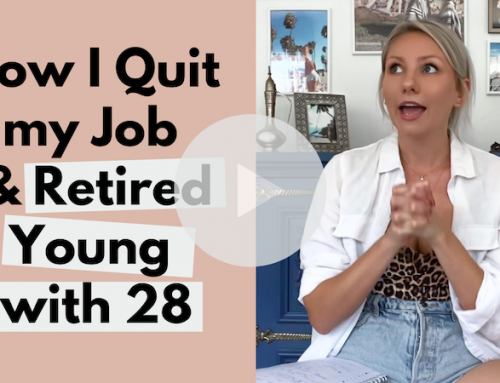If you are planning to move somewhere else, go travel, or try out the digital nomad lifestyle for a while, turning your home into a rental property is great to increase your income.
Renting your home is one of the safest ways to earn passive income. Before you start, there are certain things you should know if you want to maximise you rental income.
We earn over $24,000 in passive income through rental properties. In this post we want to share 7 tips to maximize your rental income.
Since you are here, you probably want to read these posts too:
- Digital Nomad Guide to Make Money Online
- Financial Freedom – 12 Steps For Beginners
- Financial Independence Retire Early And Travel
📌 Save this post to your Passive Income board on Pinterest to read it later!📌

Different ways for renting your home
There are multiple ways to rent your home. We will go through them below and explain the pro’s and con’s for each option.
Renting out parts of your home
Renting your home partially can be a great way to earn extra income while you still live at the house. It usually involved renting a part of your home such as a room, a floor, or a garage. You will need to have enough space, a spare room, and potentially an additional bathroom to qualify for this type of rental. You might choose to rent short-term through Airbnb, or long-term.
The positive thing is that you can keep living in your home, and get some additional income. However, you will need to share your space with someone else. If you have a small 2 bedroom apartment and you rent 1 bedroom out, you are going to feel the new addition to your home. If you have a larger property, and can have some sort of separation, this option can work much better.
With renting a part of your home, you are essentially becoming a landlord, and by that your tenant will expect certain things from you. In comparison to renting out a property in full, in this situation you will have close contact with your tenant, while having to keep the landlord-tenant relationship at the same time. This might be tough as you live under the same roof.
Renting your home short-term
Short-term home rental includes everything that is shorter than 3 months. This is usually done through Airbnb and similar platforms. You might rent your entire home or a part of your house.
The advantageous of this option is that the income you can generate is usually much higher. People pay for short-term accommodation as they pay for hotels, so depending on where your property is located, prices can go quite high. Moreover, you have more flexibility with the rental. If you want to be in the property yourself, you can block those dates from rental and reserve them for yourself.
The opposite side of the coin is that it requires a lot of management on your side. Especially if you do rentals from 2 nights. It requires a lot of communication with potential guests, Airbnb for example measures how responsive you are and shows your property more if you have a fast response time. Additionally, it requires a lot of maintenance and cleaning of the space you are renting out.
You can register as host and get a 23 EURO gift from Airbnb after you complete your first reservation if you sign up to Airbnb with our link.
Just note that your country or apartment building might have legislation around making money online from Airbnb. Make sure you know the rules and adhere to them.
Renting your home long-term
This option is the more traditional home rental. This is a rental of 3 months or longer with a contract. This options is ideal if you want to have peace of mind and know that your income will arrive each month without you having to do much work for it. Although, with this option the pay is significantly lower than with short-term rental.
Renting your home for a long period is great if you are moving away or going travelling for a long period of time. It is essential to find the right tenant, and if you find a clean and kind tenant, then being a landlord will be a lot easier. You have to do minimal maintenance of the property and only care for the home to be of a certain standard. Yet, you do not have to be busy with it on a daily or even weekly basis.
7 Tips to maximize your rental income
Here are 7 tips for renting your home and maximising your rental income.
1. Make a thorough calculation of costs
Make sure to do a thorough calculation of all your costs upfront. Landlords often tend to forget certain costs such as specific taxes or association of owners contributions. It is essential to make a comprehensive calculation of all your costs when determining your rental price. You want to make sure that there will not be any surprises later on.
If you are renting out “all inclusive”, that is including all utilities and bills, make sure to distinguish between fixed costs and variable costs. Fixed costs you can directly charge to your tenant. For the variable costs, include a clause stating that there will be a calculation at the end of the rental period. For instance, if your tenant uses much more electricity than is anticipated, your electricity bills will be higher, and you will want to charge the additional costs to your tenant.
2. Invest to make the property flawless
When renting out your home, it is essential that everything is in tact and working as it is supposed to. The tenant is paying to live comfortably in your home and does not want to encounter issues. Unless you have mentioned specific issues that the tenant agrees with, there should not be any flaws with the property.
Making sure everything in the property is working as it should and there are no major issues such as leakages will save you money and time down the road. If your rental home has many flaws you can expect to spend a lot of time talking to your tenant on the phone and getting professionals to fix things. This will require a lot of time, effort, and stress on your end. Moreover, it will also damage your relationship with your tenant.
Fixing things in bulk ahead of the rental agreement, will save you money. It is cheaper to get one or two professionals to come once and fix everything than having them come once a month.
3. Don’t exaggerate the rental price
Many landlords often exaggerate with the price of their rental home. Although at first instance it might seem good that you can rent your property for a higher price than the market average, you will need to deliver exceptional service to your tenant. You don’t want your tenant to feel like they are overpaying for what they get.
Unless you have a good reason to price your property significantly higher than the market price, you should not. It will only lead to disputes and a sour relationship with your tenant. Your costs may rise as the tenant would request unexpected things, feeling that they deserve them due to the high price. Be fair to your potential tenants, and you will have a much better experience renting out your home.
4. Do proper tenant screening
We cannot stress this enough. Your tenant will determine your experience of renting out your home. Make sure you have enough time to do proper tenant screening by placing your rental ad enough time in advance. This way you will not be in a rush and can properly review each tenant and get to know them before.
Make sure to look into their background and get proof from them that they can afford to pay the rent. The last thing you want is a tenant that thought they will be able to make the rent, but actually cannot.
Lastly, make sure you have a good chemistry with them and that your personalities click. Having a good relationship with your tenant is essential, especially when you are doing long-term rental. Therefore it is important to pick the right one for you.
5. Don’t get sentimental with tenants
It is important to build a good relationship with your tenant, however there should be limits. It is essential to keep the roles clear. Your tenant is your tenant and you are their landlord.
Stepping beyond these boundaries can lead you to become too sentimental with your tenants. It is much harder to say to a friend that if the rent is late again, you will pursue eviction than to a tenant. We are not saying you should be cold hearted and distant, but bear in mind where the boarder lays between being a landlord and being besties.
6. Keep a maintenance budget
It is essential to put aside a certain percentage of your rental profit into a maintenance budget. It might sound counter intuitive at first, as this post is about maximising your rental income. Yet, not having a maintenance budget will lead to surprises down the road that may eradicate all your rental income calculations.
Every property requires some maintenance at some point. There is no avoiding a broken fridge or a leaking tap. If you calculate for those things in advance, they will not surprise you and your rental income will remain steady throughout the rental agreement.
7. Put your business hat on
Renting your home out is like a business. Your tenant is your client and you are the business serving that client. Be sure to have some procedures in place for handling certain situations. You want to keep client satisfaction high, just like with any real businesses, word of mouth travels fast and you want your tenant to put out a good word about you.
As this is your business, you need to be firm with your clients. Payments have to be made on time according to the rental agreement, and it is your job to make sure they are. You want to maximise your profits without jeopardising the quality of your services (aka rental property). Try to cut costs low, but make sure that the tenant is not negatively impacted by that.
Do you want to increase your passive income?
Let us know in the comments section below how your freedom lifestyle looks like (where do you live? what do you do?). We will then respond to you with our advice on what passive income options you should consider!








I try to rent my home for a long period. But people always omit my house. Now I find the solution. Kudos to the author.
Thanks for talking about how you need to keep in mind the maintenance required before renting a home. It is important to consider this to make sure all is taken care of and you are living comfortably. As I see it, comparing several places to rent can help you find the best one for your needs.
I want to make passive income.kindly help.